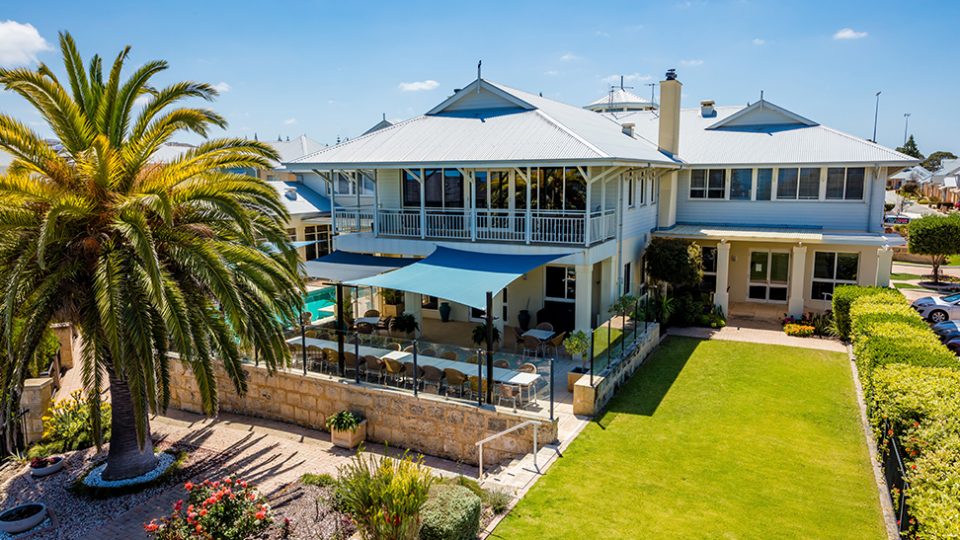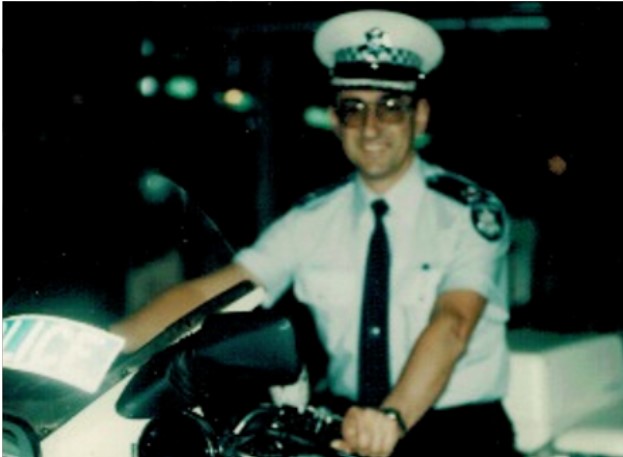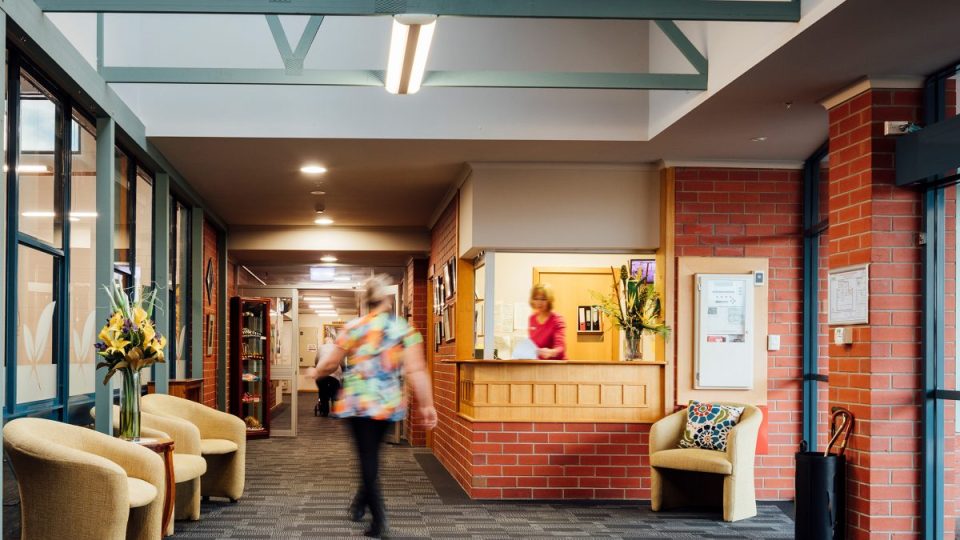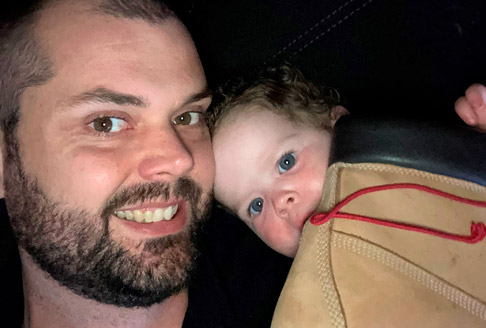Tuesday, 10 October is World Mental Health Day and World Homeless Day, two causes close to Callum Poole’s heart. A valuable part of Baptcare’s Mental Health team, Callum works in Baptcare’s Choices program, where we assist individuals discharged from hospital mental health units who may also be experiencing homelessness. We sat down with Callum to hear more about his role and what he’d change in the mental health space if given a magic wand. And speaking of wands, we also learnt about his love of all things Tolkien and Hobbiton but that’s another story.
What is your current role and what does it involve day to day?
My current role at Baptcare is Mental Health Practitioner in the Choices program, assisting people who are being discharged from the mental health ward of hospitals (and who are also at risk of homelessness) to find short-term housing. My day starts early as I have three little kids, a four-year-old boy and twin girls who just turned two. During the day I try to spend as much time as I can at the shelter to build a therapeutic relationship with the clients. I take them to appointments, advocate for them but mostly what I do is a great deal of listening.
How long have you been working within the Mental Health team at Baptcare?
I started working at Baptcare in May of 2022, so about a year and a half.
Can you explain a bit more about Baptcare’s Choices program?
The Choices Program operates in the south of Tasmania in partnership with the Royal Hobart Hospital. People can be referred to Choices while they are at inpatient locations such as the Department of Psychiatry, or other mental health residential or respite accommodations. The program also supports people in the community following discharge, with the aim to assist their return to the community and reduce the need for re-admission. Often the circumstances leading to admission include homelessness, in which case Choices can provide short-term emergency accommodation and intensive psychosocial support, allowing timely exit from inpatient services.
What do you like about working with Baptcare and in the mental health space?
I love the team I work with, and this is so important to me. It is a challenging role working with homeless people who have just come out of the Mental Health Wards but having a good team that I can be real with helps immensely.
Working in the mental health space is great, I enjoy going home knowing that I am making a massive difference in people’s lives. I also see it as a great privilege to work with people in their most vulnerable moments and for them to trust me enough to let me in to their world.
World Mental Health Week aims to address what more needs to be done to make mental health care a reality for people worldwide. If you had a magic wand, what is something you’d change in the mental health space?
Big question. I think it would be around lifting the shame that is associated with having a mental health issue. Talking to clients, friends, family and from my own experience, shame is often the barrier that stops people from getting the help that they need. By removing shame, I believe, people will seek help sooner which is shown to have positive impacts.
Did you always want to work within the mental health space and what are some other jobs you’ve performed in your career?
Working in Mental Health is not something I particularly wanted to do before starting the role. However, looking over my previous roles, they all have some form of mental health aspect to them.
I have had an array of ‘people helping’ jobs:
* School chaplain for 10-plus years, here in Hobart and the greater Darwin area.
* Worked at a halfway house with individuals out of prison who were not managing their mental health medication correctly.
* Launch Youth, a male youth homeless shelter.
* House Parent in Darwin looking after hundreds of Aboriginal boarders from the top end of Australia.
What is one thing you wished people understood/knew about mental health?
The pervasiveness of having a mental health condition and the impact it has on every area of life.
What did you want to be when you grew up?
When I was young, I wanted to be a scientist. I love understanding why things work the way they do.
Can you tell us 2 surprising things about yourself?
- I am tall, I am 208cm
- And no, I do not play basketball.
Do you have a favourite quote or motto in life?
I have two.
“Caffeine is not a drug; it’s a vitamin.”
“A man without a vision is a man without a future. A man without a future will always return to his past.” – P.K Benard
What are two things on your bucket list?
I want to go to New Zealand and geek out at Hobbiton and spend as much time and money as my wife will let me. I love the works of Tolkien.
I want to do a cycling tour of Tasmania. I think it will be a lovely way to slow down, (very slow with my current level of fitness!) and see this beautiful state.
If you could sit next to someone at a dinner party, who would it be and why?
I would love to sit down and have dinner with J. R. R. Tolkien. It would be great to ask all the questions that I have in my head regarding his written works like – what happened to the Entwives? Did he purposely make the name Denethor and Théoden similar? And where was Gondor when the Westfold fell?
Thank you, Callum, for all that you give to our Baptcare community and for being a man with a vision. One day soon we look forward to seeing photos of you geeking out at Hobbiton with a strong cup of coffee in hand.
Community news
-

BaptistCare to acquire Keyton’s Western Australian retirement village portfolio
BaptistCare is pleased to announce that we have entered into an agreement to acquire Keyton’s portfolio of retirement villages in WA.
- 13 Nov 2025
-

Spotlight on Residents: Reg Baker
At Baptcare, we are always delighted to learn more about our residents’ lives. They are often filled with excitement, joy, and adventure, and it truly reminds us how rich a person’s life is—and continues to be—when they join one of our residential aged care communities. Today, we are honoured to share the remarkable story of one of our residents, Reg Baker, who lives at Baptcare Peninsula View Residential Aged Care community.
- 10 Nov 2025
-

Staff spotlight | Leonie Irvine – 35 years of service in aged care
Leonie is one of our dedicated Lifestyle Assistants at Karingal Residential Aged Care community in Devonport, Tasmania. She recently celebrated an incredible milestone - 35 years of continuous service at Baptcare. In a sector where long-term service is increasingly rare, Leonie’s 35-year journey stands out as something truly special.
- 10 Nov 2025

